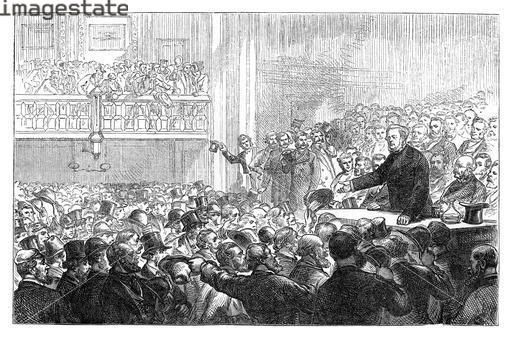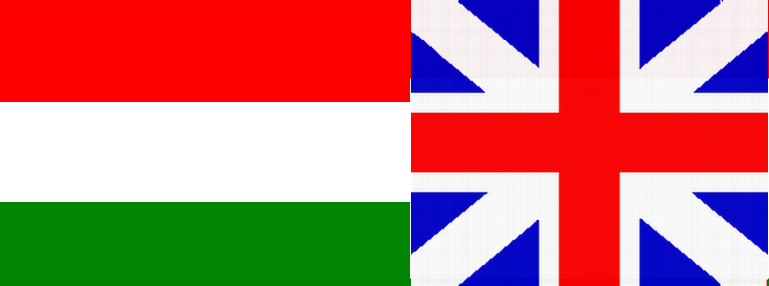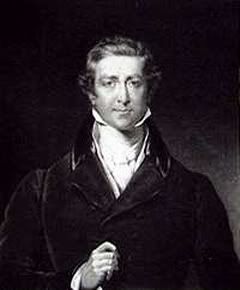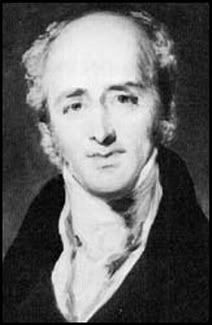The Election of 1836 and the Formation of the Republic of Britain
In the aftermath of the Civil War and the collapse of the British Empire the country joined together once more in the name of restoring the nation. It was agreed that the fate of Britain was to be decided by a new Parliament to be elected at the start of 1836. On one side the Tories supported the restoration of the old institution of Constitutional Monarchy whilst the Radicals and Whigs supported the proclamation of a Republic.
The Conservatives actually performed very well considering their alienation in many major cities (notably London) that the Civil War had caused. However they fell 42 seats short of a majority. This allowed the second and third parties (the Whigs and Radicals) to join together to form the new government.
Charles Grey, the 2nd Earl Grey was to become the first Prime Minister of the new British state. Ironic that a man so opposed to Radicalism and its principles was now leading a government in which they contributed more than a third of seats. Whilst his personal ideals might have clashed with the coalition Grey was first and foremost concerned with bringing peace to Britain and preventing a full blown overthrow of the old order, that he was a part of, as had happened in France. He regarded the creation of a liberal Republic and an alliance with the Radicals as the only way to achieve this.

Yet the Whigs enjoyed a more dominate position within the coalition than their number of seats (just 59 more than the Radicals) might insinuate. To understand why we must look at the Radical Party. In truth, the Radical Party was more a coalition of the more extreme political elements on the British Left. The Party’s main component parts were: the Chartists (who controlled 36 seats), the ‘traditional Radicals’ – essentially sycophants of the French and American Revolutions of the 18th century (27 seats), Christian Reformers – men who wanted to reform the political and economic system of the country on moral lines (12 seats) and, worryingly for their leader John Bright, ‘Radical Whigs’ – essentially ‘extremist’ Whigs who demanded a much greater degree of reform than the main Party, most from this faction had joined the rebels during the Civil War and had since remained with the Radicals (41 seats).
John Bright was in a strong position to hold together the Left of his party (Chartists, traditional Radicals and Christian Reformers) as he had stood for the causes of these sections of the Party. However, the Radical Whigs were much harder to hold on to. On the whole these men, more than any others, celebrated the coalition as it ensured both the wide sweeping reforms they desired and prevented the Left of the Radical Party from going too far. Bright found it very difficult to control this wing of the Party and would try to appease it by supporting Free Market economics whilst limiting the pressure he exerted on his Whig coalition partners. Prime Minister Grey would thus find it easy to pressure Bright into being a ‘following’ member of the coalition whilst the Whigs would remain the clear ‘leaders’. At the same time Grey could always look right and use the Tories if the Radicals tried to push him too far. In an ideal position to play both his Radical coalition partners and the Tory opposition off one another Grey could ensure an unnatural dominance for the Whigs in spite of his party falling significantly shorted of a majority.
The strength of the Whigs lay in their unity as a Party. Whilst they featured a great array of diverse opinions Grey seemed to have secured Party unity through the sheer strength of his personality. Whilst factions in both the Radical and Conservative Party might vote against the leadership the Whigs would not so long as Grey remained. However, at 72, there were fears that his health might fail and this unity within the Whigs might collapse – potentially bringing the government down with it.
One of the first things that was agreed upon when the new Parliament opened and discussions on the future British state began was the creation of the Republic of Britain. Indeed, on just the second day of the new Parliament, to raucous cheers from the Whig-Radical coalition and boos from the Tories, Prime Minister Grey proclaimed the Republic. With this move Grey had secured the goodwill of the Radicals – cementing his popularity on the Left. However he had alienated the strong Monarchist elements within his own party and angered the Tories. Seeing himself as the bringer of peace to Albion, Grey took the opportunity to score points with the opposition over the issue of Britain’s future flag.

With the new Republic the Radicals demanded a new flag. Many hoped that the Republican Tricolour could be adopted whilst others thought that the Union Jack should be modified so that the Cross of St Patrick (representing Ireland) would be removed. However this would essentially mean recognition of the Irish Republic and the abandonment of the Ireland. This was a subject upon which passions frequently ran high, especially for the Tory leader Wellington who was born in Ireland. Not only would the adoption of the old flag of Great Britain (before Union with Ireland) enrage the Tories it would also send a message to the Protestant Ulstermen – many of whom still considered themselves to be British – that Britain was no longer concerned with restoring rule in Ireland. The Whigs joined with the Tories to put up a strong front against any potential changes to the flag.
On the subject of the position of Parliament Grey supported a system that adopted ideas of the Radicals but was largely Whig. The House of Commons was to be the supreme body of the British Republic – all new legislation would have to pass through the House, as would external policies (notably a declaration of war and the signing of any treaties with foreign states). The Commons would also become the sole House in Parliament. Radical designs to create a President were ignored, although the Whigs did accept that the Prime Minister should have the right to call a new election at any time and the right to appoint Judges to the Supreme Court (modelled on the body of the same name in the USA – more on this later). In line with Radical wishes the maximum Parliamentary term would be set at 6 years, although new elections could be called at any time by the Prime Minister. In order to become Prime Minister a Member of Parliament must secure the confidence of the house (a majority of MPs willing to support his occupation of the position) if he was to ever lose the confidence of the House then he must resign. If no individual can secure the confidence of the House then the leader of the largest Party is to be called to form a government. If a stable government cannot be formed then the Prime Minister is obligated to call a new election.
The before mentioned Supreme Court was created by the Grey government as an effective substitute for the now defunct Monarchy. Essentially it existed to act as an arbitrator when Parliament could not. It had the power to rule on disputes over the new constitution of the Republic (unlike the American Constitution it was not clearly laid out in a single document but was represented by the laws passed by Parliament). It also had the power to intervene in constitutional crises arising from a failure of Parliament to form a government. Once again Grey looked to mix a new institution with the old as the first 9 members of the Court were prominent members of the defunct House of Lords – they included 4 Tories, 4 Whigs and a Radical. Each judge would be appointed for a term of 10 years, after which they would have to be replaced – they had the right to resign at any time.
Beyond this the new government also issued several major reforms, many of them inspired by the French and American Republics of the previous century:
Freedom of speech for all citizens was guaranteed.
Freedom of religion was guaranteed – in practical terms this meant the removal of all anti-Catholic legislation.
The separation of Church and state was announced.
All citizens would be guaranteed a trial before a jury of their peers before being judged.
The issue of suffrage was also addressed. The new government changed the laws of enfranchisement from being based on wealth to being based on education. Now only literate citizens who had passed a short literacy test would be eligible to vote. This followed the idea that only those who could understand politics should be able to influence it. This move satisfied the more conservative members of the Whig Party (as well as much of the Tory party) whilst also satiating the Radicals. At first glance it removed a more offensive legal facet of the franchise and made it possible for men of all social classes to vote in reality the franchise was only marginally expanded. Not only was the adequate degree of literacy not particularly widespread amongst the working class it would also be much more difficult for workers and farmers to take the time make their way to the office where the literacy examinations were to be held and then take them. As a side note all citizens already enfranchised were to be exempt from having to take the test.
Finally, Grey set up a commission to investigate Child Labour. Within Parliament there was a lot of support for there to be no legislation barring this increasingly common practise. Some argued that it would harm the economy (this view was especially strong within the Whig Party – dominated by commercial interests), others objected to an end to Child Labour on the grounds that if children could not work then many families would be pushed from poverty to starvation, there was also a widespread view that work improved the character of children in later life. The commission was to report its findings to Parliament in one years’ time after which the House would decide the future of the issue.

In the aftermath of the formation of the Republic there was a significant political change within the country’s single largest party. The Duke of Wellington, now 67 (5 years younger than the Prime Minister), chose to step down from his position as leader of the Party in favour of the 47 year old Robert Peel. Wellington feared both his age and his political position on the Tory Right meant that he would be less able to win the next election than the younger, more energetic and more liberal Peel. With the opposition leader now 25 years the junior of the Prime Minister the Conservative Party seemed to have a significant degree of confidence restored as it looked towards the future. Just as a new and reforming figure took hold of the Party Wellington would remain on the Shadow Cabinet and would continue to maintain his influence within the Party – ensuring that Peel could not go too far.






